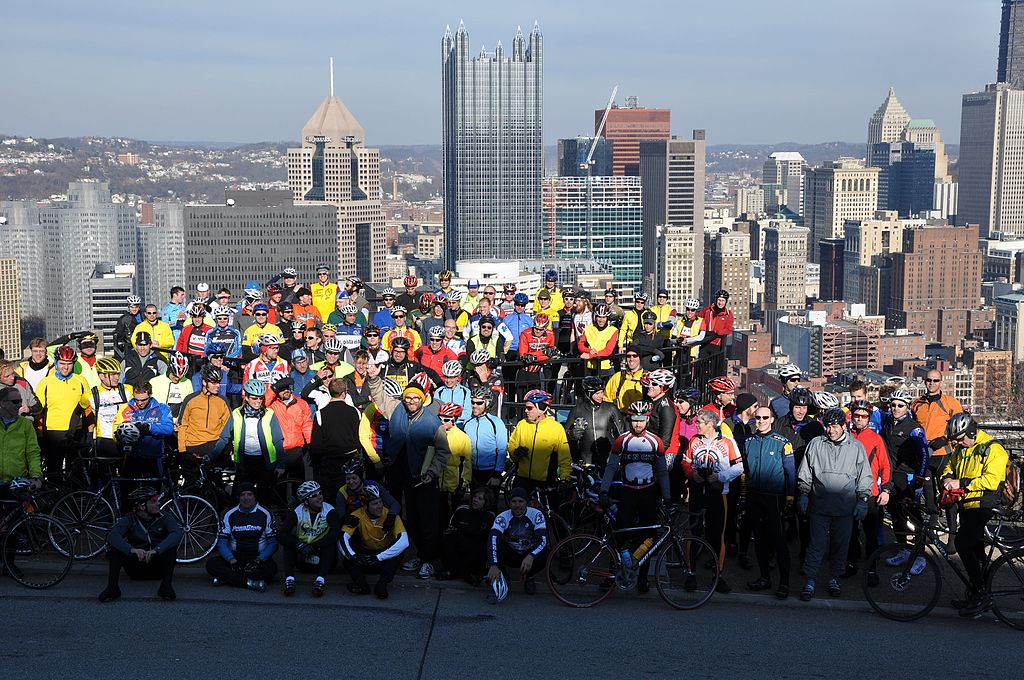
(Chrispopovic/Creative Commons)

(Chrispopovic/Creative Commons)
Give a man a fish, and he shall eat for a day. Teach a man to fish, and he shall eat for a lifetime. This adage is the first thing that comes to mind when I think about sustainability. I imagine a fisherman, yellow rubber rain suit and all, showing a famished man how to cast a line into the dark depths of an ocean, lake, or river. Though they cannot see it, the men know there is a dependable dinner down there. That is, until there isn’t. You see, the thing about “teaching men how to fish” is that there simply aren’t enough fish to go around. If everybody did it, before long, the world would know hunger as if they were holding hands with it.
The best example of sustainability in action I know is the social network that is the bicycling community in my hometown of Pittsburgh. First of all, bicycles are perhaps the most efficient form of transportation; they’re much less resource-intensive than cars, they don’t require paved roads, which yield both habitat fragmentation and road kill from automobiles, and they can take you farther and faster with less effort than skateboards, scooters, and roller blades.
Another sustainable element of a bicycling community, particularly the one in Pittsburgh, is the very fact that it is a community. I would love to tell a story about a particular business, a distinguished bike advocate, or a stout city cyclist, but I’m afraid that would create a false narrative that the community is led by a single person or organization more so than any other.
In the way that there are many parts that make a bicycle function, there are many components and organizations that make the Pittsburgh bicycling community run smoothly. With that analogy in mind, the benefit of having a compartmentalized whole is that when one part breaks, you can fix it without having to fix or replace the entire whole. Like the handlebars of a bicycle, the organization, Bike Pittsburgh, steers the cycling community in the direction most cyclist want to go in terms of constructing bike lanes and enforcing traffic laws. Like the seat of a bicycle, the Pittsburgh Port Authority busses have front-mounted bike racks to carry the bike far across town along with its rider. Like the gears of a bicycle, the Free Ride Bicycle Collective helps people overcome the steep hill of repair costs by providing a free-to-use repair shop supported and operated by the people who use it.
The bicycling community in Pittsburgh is a collection of activists, advocates, City government employees, bike shops, bike sharing systems, cyclist race tracks, community events, and trails – one of which stretches over 300 carless miles to Washington D.C.! While Pittsburgh has a sustainable network of bike interest groups and avenues of recreation, the community-centered structure is scalable the world over. From Portland, Oregon to Portland, Maine; from Copenhagen to New Delhi, cycling has proven scalable and sustainable so long as the community are willing to commit to bike lanes as much as they are willing to commit to 4-lane highways.
Like a fisherman without a rod, organizations like the Free Ride Bicycle Collective can teach people how to repurpose, build, and fix their own bikes. While fishermen do not always have access to water, we always have access to the land we live on. We can’t expect to feed the world by teaching every man to fish, giving every man a fishing rod, and building bodies of water near every man. What we certainly can do, however, is mobilize the world by teaching everyone to ride a bike, making bicycles accessible, and working with local government to provide and maintain adequate infrastructure for cyclists. One bike, alone, will not change the world much, but imagine an ocean’s worth of schools of cyclists, and you’ll see a multitude of mobilized men and women whose sustainable lifestyle is as irreversible as learning to ride a bike.